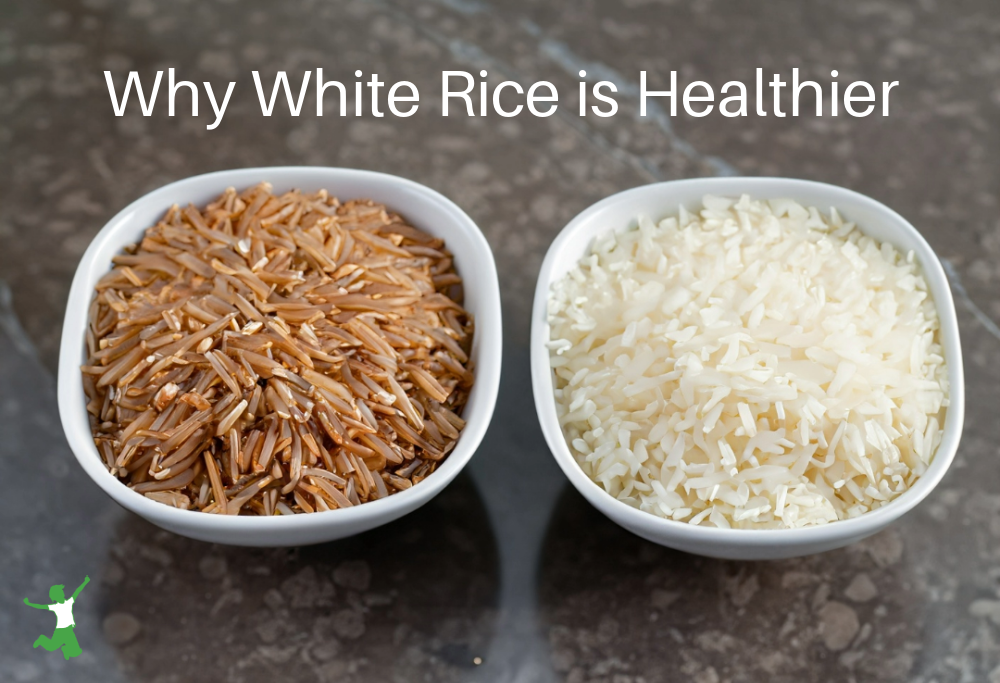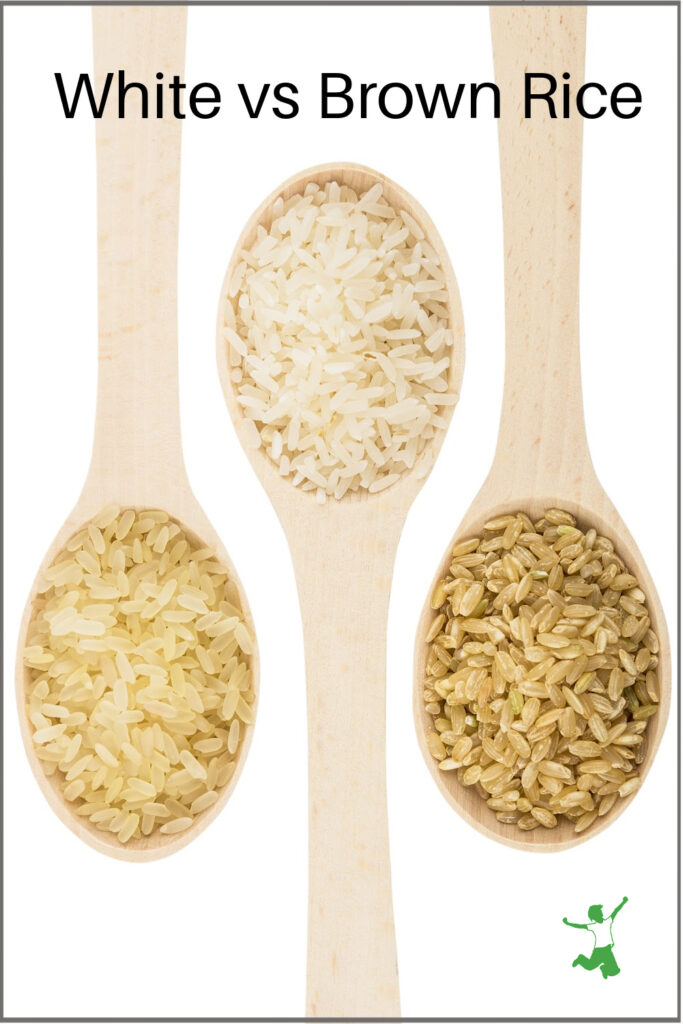The reasons white rice is healthier than brown rice as determined by research as well as which type traditional societies preferred consuming.

My article and video on healthy Chinese food drew some comments from readers who questioned my choice of rice.
Why was I using white rice vs brown? Isn’t brown rice the healthier choice, after all?
Ok, I’ll spill the beans, rice. Here are my reasons …
The truth is, neither my husband nor myself have ever enjoyed brown rice (although we love the nutty flavor and digestibility of wild rice).
Every time we eat brown, it just seems to not sit very well in our stomachs.
Even when it is sprouted or soaked before cooking, it, well, uh, sits like a brick for lack of a better word.
Why Some People Should Eat White Rice
White rice just seems to digest a whole lot better for us. That to me was reason enough to choose it over the brown rice.
We were also advised by an Ayurvedic MD back in the 1990s to stick with white basmati rice. This recommendation clinched the decision.
You are what you digest, after all – not necessarily what you eat!
End of story? Well, not quite.
Rice Fiber in Brown Harms a Compromised Gut
A few years back at the annual Wise Traditions Conference, I became familiar with a compelling book called Fiber Menace.
The author writes extensively about the dangers of a high-fiber diet as it pertains to a menu loaded with whole grains as pushed by the misguided Food Pyramid.
In other words, folks who eat a bowl of All Bran every morning to keep the bathroom visits regular are unknowingly ripping their insides to shreds.
The basic premise of Fiber Menace is that grain fiber plays a leading role in many gut-related ailments including colon cancer.
When I first learned of this information, my preference for white rice over brown rice started to make more sense.
Perhaps the brown rice didn’t digest that well because of all that fiber?
Chalk one up for the white rice.
White Rice Far Lower in Phytic Acid
A second piece of information came from author Ramiel Nagel.
In his book, Cure Tooth Decay, he writes about the devastating effects of phytic acid in the diet. Phytic acid is a very powerful antinutrient and blocker of mineral absorption in the gut.
Mr. Nagel identifies brown rice as very high in phytic acid.
What’s more, soaking brown rice does not reduce phytic acid by much at all!
Polished Rice is the Ancestral Form
Ramiel also maintains that the traditional method for preparing brown rice is never to eat it whole (with only the husk removed).
Rather, ancestral societies pounded brown rice in a mortar and pestle to polish it by removing the outer bran layer. This is the primary source of the phytic acid.
Nagel goes on to point out that experiments have shown that the milled and polished rice that results from this pounding process, has the highest mineral absorption.
In short, mineral absorption from whole brown rice is much less than white polished rice. This is because the phytic acid in the bran which is not reduced much by soaking, greatly interferes with the absorption process.
What About Arsenic?
A big issue with arsenic contamination in rice has emerged in recent years. Some folks have responded by no longer eating rice at all.
This is an overreaction, in my view.
Clean rice is definitely available if you know what to look for.
This article on how to avoid arsenic in rice details what to do. While soaking brown rice barely moves the needle on phytic acid, soaking white rice before cooking removes nearly all the arsenic!
Another option is to parboil white rice before using fresh water for a full cook if you don’t have time to soak.
Is White Rice Better Than Brown?
So it seems that brown rice is not necessarily a healthier choice than milled white rice.
Black or red rice would fall into the same category.
Obviously, whether you choose one or the other is a personal preference, but I hope this information helps you sort through the decision with a bit more clarity.
As for me and my family, we will be sticking with white basmati and jasmine rice (white basmati rice is more nutritious than plain white rice).
I currently buy this brand of rice in 25-pound bags as the most economical and high-quality choice.
Observation clued me in many years ago that brown rice was not something that was sitting well in my stomach or my husband’s.
As the years go by, more research is coming forth to indicate that this decision was the right way to go after all.
Do you eat white rice or brown rice in your home? Why or why not?

References
(1) Fiber Menace
(2) Living with Phytic Acid
More Information
Macrobiotic Diet and Extreme Vitamin D Deficiency
Tiny Teff Grains Deliver Big on Nutrition
How to Make Perfect Yellow Rice (Arroz Amarillo)
Millet: Healthy or Not?
Do Whole Grains Cause Cavities?






i eat all types of rice i enjoy all flavors and textures..i mix it up everyonce in a while.. but overall i try not to eat to much breads or grains w/e eat more veggies on the side!
So have you sprouted brown rice? You can’t do that with white? Maybe that is the problem.
White! It’s always tasted better, been easier to cook, and easier for my body to handle…
Interesting. I’ve never seemed to really like brown rice either, not only because of the taste but how I felt after eating it.
Now I have a nutritional reason to shout to the world that YES! I eat white rice and it’s okay!!!
Interesting….I’ve been a fan of both since I was a kid, but the problem I’ve been having with brown rice (that I am hoping others may be able to comment on) is that the oils in the bran go rancid very quickly, unless you have a fresh source and put it in the fridge at home. Being told that “whole” is better my whole life (I’m 26), I’ve finally come to this same conclusion, that it is not always so. Rancid oils are poison to the body, and so I would rather have a little less “fiber” and not deal with the tummy-ache I get from eating rancid oils. Now I don’t feel bad at all about skipping the brown rice–humans don’t need grains to survive.
I used to think the same thing, but that’s not necessarily true…Most packaged organic brown rice is stored in silos designed to limit oxygen, the bags are flushed with nitrogen and the rice itself is generally transported and stored in cold conditions before being put on shelves…so the chances of it going rancid are actually really slim. Brown rice is without a doubt way more nutritious than white rice and more beneficial to the body in many other ways, fiber being one of them. Simply soaking the rice for 12-24 h and adding a bit of whole wheat flour takes care of the excess phytate. Humans definitely need grains to achieve optimal health…you can also try subsisting on potatoes…civilizations were built on grains, there’s no way to support 7 billion of us without all of us making grains a dietary staple in some fashion.
Sarah,
I’m not sure why fiber is such a menace since so many cultures have had whole grains as part of their diets for thousands of years–even substantial amounts ten thousand years ago. While I understand that cultures at both ends of the Earth may have remained healthy in spite of their diets’ lacking in features the European diets incorporate, there are no scientific studies that have substantiated that whole grain fiber is anything other than beneficial. Of course, everything in moderation. Science is built upon proving or disproving a hypothesis. An approach to a question is either scientifically approached or non-scientifically approached. Only through hypothesis and studies is something truly proven. It simply is disingenuous and non-scientific to, at once, serve yourself up as an authority with a degree in home economics–and the implied science that a degree infers– and, in the same manner to offer up advice based solely on how your alimentary canal is digesting–be it nineteen years of white rice or a week after ‘drinking the water in Mexico’. In other words, your looking at a Harvest Moon and exclaiming how bright it is to your eyes does not make it a star. It simply makes it bright. Nothing less and nothing more. Also, if you approach nutrition solely in relation to a doctor’s writings of eighty+ years ago, or a one-time pharmacist’s non-scientific postulating of thirty+ years ago, then stem cell research and its benefits–as an example– could not exist today because they were unknown yesterday. This does not disprove them; rather, it begins to disprove your teachings as time marches on but your knowledge is left in a time capsule that existed as it did in the 1930’s or 1970’s. Not as it is in the 21st century. Respectfully, you have many wonderful qualities, Sarah, but you cannot expect to be continuously correct looking backwards and not forward. Imagine your children boasting that they are going to a college that will give them knowledge to the beginning of the third quarter of the last century. That’s what you are boasting is the definitive ‘end’ to knowledge of whole grain foods. Logically, this cannot be so.
That’s good to know. I don’t like brown rice and felt a bit guilty about it.
My guess is that ALL whole grains have more lectin activity, as the lectins are found in the germ/bran and not in the starch. This is *probably* why people naturally over the last many hundreds of years, re-fined their grains (or, of course, fermented, etc). My grandma always peels potatoes (more toxins found in the skin) and eats her rice white, and she’s 98 and healthy.
It’s interesting that the whole fiber/whole grain movement began in the late 60s and 70s – the “health food” movement, and we’ve had so much more gut dysfunction since then. Undoubtedly antibiotic overuse (leaky gut, etc) play a role in this, but I also wonder how the lectin connection from “whole grains” and fiber play a role…
Very good points, Sean. I wonder how long before the jury comes back in. We are still learning.
I think the whole-grain movement took hold when masses of Americans began to have problems with irregularity/IBS, etc., due to lack of exercise and increased consumption of overly processed foods (boxed mixes, cold cereals, etc.), including bread so loaded with preservatives that it would stay “fresh” for days and inactivate many digestion processes in your body, and it was discovered that the addition of grain brans to the diet would relieve the gut problems that were weighing down so many of us; and, of course, wheat-germ replaced the vitamins that were destroyed in the “preservation” process of “store-bought” white bread.
I live in Japan and no one here eats brown rice. when you go to the store there is a large aisle of white rice and one small bag of brown rice. Here, brown rice is generally regarded as unhealthy. I thought it was strange that people in the united states thought brown rice was better when I visited there.
I forgot to mention, we eat short grain japonica rice, I think it’s called calrose rice in the states